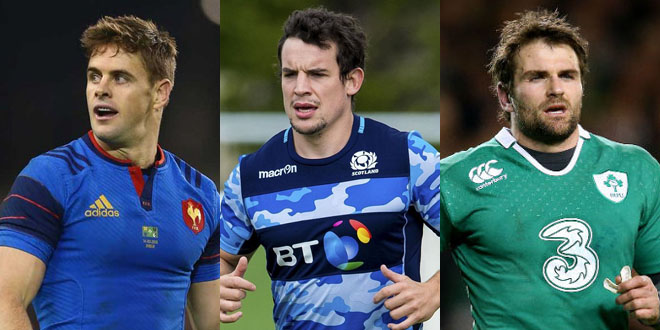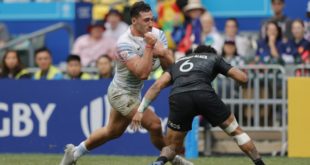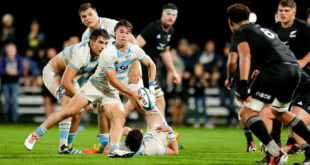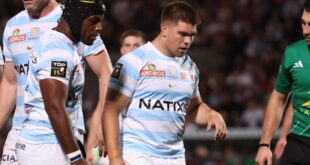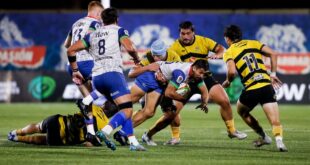A popular topic of debate heading into the World Cup is that of eligibility, particularly that resulting from the residency method. Americas Rugby News takes an in-depth look at the foreign-born players in each squad, where they were born and how they are eligible.
An interesting fact – only Argentina can claim that all 31 players in their squad are native to their country. The other 19 teams all have players born abroad, including significant numbers in some of rugby’s most powerful nations.
All told, Rugby World Cup 2015 will have a grand total of 33 countries involved in the tournament. Surprisingly, Africa leads the way with Algeria, Burkina Faso, Cote d’Ivoire, Democratic Republic of the Congo, Nigeria and Zimbabwe joining the participating Namibia and South Africa. Zimbabwe has players representing four countries, more than any other non-competitor.
Spain is another to have athletes representing multiple countries while other countries include Belgium, Israel, Papua New Guinea, Saudi Arabia, and the Netherlands are also all represented. Australia, England, New Zealand and South Africa lead the way in terms of players representing others at the World Cup.
SAMOA (13) The country with the largest number of players from abroad is Samoa. All of Samoa’s players born in another country are New Zealanders who are eligible based on having one or both parents from Samoa. A handful of them have previously represented other nations at other levels. Ole Avei played for Australia u21, both Kane Thompson and Faifili Levave for New Zealand u21, Jack Lam spent two years in the Australia Secondary Schools side, and Tim Nanai-Williams was a New Zealand 7s international before using the Olympic loophole to switch his allegiance during the past year.
| PLAYER | POS | BIRTH COUNTRY | ELIGIBILITY |
| Ole Avei | HO | New Zealand | Parent |
| Manu Leiataua | HO | New Zealand | Parent |
| Motu Matu’u | HO | New Zealand | Parent |
| Census Johnston | THP | New Zealand | Parent |
| Anthony Perenise | THP | New Zealand | Parent |
| Filo Paulo | LO | New Zealand | Parent |
| Kane Thompson | LO | New Zealand | Parent |
| Jack Lam | FL | New Zealand | Parent |
| Faifili Levave | FL | New Zealand | Parent |
| Kahn Fotuali’i | SH | New Zealand | Parent |
| Mike Stanley | FH | New Zealand | Parent |
| Johnny Leota | CE | New Zealand | Parent |
| Tim Nanai-Williams | FB | New Zealand | Parent |
WALES (12) Wales is a Tier 1 nation packed with players born abroad. To suggest they are there on eligibility grounds, though, would be very misleading. Most of the foreign-born players in the squad grew up in Wales, with props Tomas Francis and Aaron Jarvis, second row Jake Ball, and wing Alex Cuthbert the exceptions. The number increased from 10 to 12 following the losses of Eli Walker and Scott Williams. His replacement, Ross Moriarty, is the son of Paul Moriarty who played in Rugby World Cup 1987 for his native Wales. New Zealander Gareth Anscombe similarly was called up to replace an injured player.
EDIT NOTE: Matthew Morgan was erroneously listed as having been born in England. In fact he was born in Swansea, Wales. The numbers have been adjusted to reflect that error.
| PLAYER | POS | BIRTH COUNTRY | ELIGIBILITY |
| Tomas Francis | THP | England | Grandparent |
| Aaron Jarvis | THP | England | Grandparent |
| Jake Ball | LO | England | Parent |
| Luke Charteris | LO | England | Residency (1986) |
| James King | FL | Australia | Residency (1993) |
| Dan Lydiate | FL | England | Parent |
| Ross Moriarty | FL | England | Parent |
| Toby Faletau | N8 | Tonga | Residency (2001) |
| Alex Cuthbert | WI | England | Parent |
| George North | WI | England | Parent |
| Hallam Amos | FB | England | Residency (2004) |
| Gareth Anscombe | FB | New Zealand | Parent |
TONGA (12) Tonga is comparable to neighboring Samoa in that there is a large section of the World Cup roster who qualify based on their parents, having left to live in developed countries. Also like Samoa, many of Tonga’s foreign legion happen to be players who never played rugby in Tonga prior to senior tests. Tevita Mailau, Paul Ngauamo, Siale Piutau, and Telusa Veainu all played for New Zealand at age grade level, and Steve Mafi was an Australia u20 international before opting for the country of his father.
| PLAYER | POS | BIRTH COUNTRY | ELIGIBILITY |
| Tevita Mailau | PR | Australia | Parent |
| Paul Ngauamo | HO | New Zealand | Parent |
| Uili Kolo’ofai | LO | New Zealand | Parent |
| Lua Lokotui | LO | New Zealand | Parent |
| Steve Mafi | LO | Australia | Parent |
| Joe Tu’ineau | LO | Fiji | Parent |
| Jack Ram | FL | Australia | Parent |
| Kurt Morath | FH | New Zealand | Parent |
| Siale Piutau | CE | New Zealand | Parent |
| Viliami Tahitu’a | CE | New Zealand | Parent |
| Will Helu | WI | New Zealand | Parent |
| Telusa Veainu | WI | New Zealand | Parent |
SCOTLAND (12) The players qualify based on a variety of criteria with some qualifying based on living in the country while others have parents or grandparents from Scotland. A number of players involved were selected based on their ancestry before ever playing a match in the country. Sam Hidalgo-Clyne moved to Scotland at an early age, while the three residency players were earmarked for Scottish duty the moment they signed their contracts. Blair Cowan joined the squad during the pool phase as a replacement for Grant Gilchrist, giving Scotland more players from abroad than Japan.
| PLAYER | POS | BIRTH COUNTRY | ELIGIBILITY |
| W.P. Nel | THP | South Africa | Residency (2015) |
| Tim Swinson | LO | England | Grandparent |
| John Hardie | FL | New Zealand | Grandparent |
| Ryan Wilson | FL | England | Grandparent |
| Blair Cowan | FL | New Zealand | Parent |
| David Denton | N8 | Zimbabwe | Parent |
| Josh Strauss | N8 | South Africa | Residency (2015) |
| Sam Hidalgo-Clyne | SH | Spain | Parent |
| Henry Pyrgos | SH | England | Parent |
| Sean Maitland | WI | New Zealand | Grandparent |
| Tommy Seymour | WI | USA | Parent |
| Tim Visser | WI | Netherlands | Residency (2013) |
JAPAN (11) Unsurprisingly the Brave Blossoms have a number of expatriate internationals, with most originally coming to Japan on professional contracts. Koliniasi Holani and Michael Leitch both moved to the country for school as teenagers, while Amanaki Mafi arrived for university. Kotaro Matsushima split his schooling between South Africa and Japan, the home country of his mother.
| PLAYER | POS | BIRTH COUNTRY | ELIGIBILITY |
| Luke Thompson | LO | New Zealand | Residency (2007) |
| Michael Broadhurst | FL | New Zealand | Residency (2012) |
| Justin Ives | FL | New Zealand | Residency (2011) |
| Michael Leitch | FL | New Zealand | Residency (2007) |
| Hendrik Tui | FL | New Zealand | Residency (2012) |
| Koliniasi Holani | N8 | Tonga | Residency (2001) |
| Amanaki Mafi | N8 | Tonga | Residency (2013) |
| Male Sa’u | CE | New Zealand | Residency (2011) |
| Craig Wing | CE | Australia | Residency (2013) |
| Karne Hesketh | WI | New Zealand | Residency (2013) |
| Kotaro Matsushima | WI | South Africa | Parent |
FRANCE (10) Arguably the most curious case of all is France, whose head coach has selected many foreigners in positions in which there are countless options of quality players. Why a country with 30 fully professional clubs to choose from should make such a decision is a question only Philippe Saint-André can answer. African imports Yannick Nyanga, Fulgence Ouedraogo, Sofiane Guitoune, and captain Thierry Dusautoir all moved to France during their childhoods, while Vincent Debaty arrived to pursue a professional career at the age of 18.
| PLAYER | POS | BIRTH COUNTRY | ELIGIBILITY |
| Vincent Debaty | LHP | Belgium | Residency (2002) |
| Uini Atonio | THP | New Zealand | Residency (2014) |
| Thierry Dusautoir | FL | Cote d’Ivoire | Parent |
| Bernard le Roux | FL | South Africa | Residency (2012) |
| Yannick Nyanga | FL | DR Congo | Residency (1987) |
| Fulgence Ouedraogo | FL | Burkina Faso | Residency (1989) |
| Rory Kockott | SH | South Africa | Residency (2014) |
| Sofiane Guitoune | WI | Algeria | Residency (2002) |
| Noa Nakaitaci | WI | Fiji | Residency (2014) |
| Scott Spedding | FB | South Africa | Residency (2011) |
AUSTRALIA (9) The multicultural Wallabies roster may at first glance appear to be a gathering of players groomed elsewhere, but only Henry Speight did not play schoolboy rugby in Australia, instead having done so in New Zealand. Will Skelton and Tevita Kuridrani played u20 rugby for Samoa and Fiji respectively, but each did so while still residing in Australia.
| PLAYER | POS | BIRTH COUNTRY | ELIGIBILITY |
| Stephen Moore | HO | Saudi Arabia | Residency (1991) |
| Dean Mumm | LO | New Zealand | Residency (1987) |
| Will Skelton | LO | New Zealand | Residency (1995) |
| David Pocock | FL | Zimbabwe | Residency (2005) |
| Will Genia | SH | Papua New Guinea | Residency (2003) |
| Quade Cooper | FH | New Zealand | Residency (2004) |
| Tevita Kuridrani | CE | Fiji | Residency (2010) |
| Henry Speight | WI | Fiji | Residency (2014) |
| Joe Tomane | WI | New Zealand | Residency (1996) |
ITALY (9) Often criticized as failing to produce home-grown talent, Italy is fielding fewer players from abroad at this year’s World Cup than was the case in years gone by. The flow of Argentine players into the country has decreased and a new generation of quality home-grown backs is now taking shape. Fijian loose forward Samuela Vunisa is unique in being the only Italian squad member qualifying on residency since the last World Cup. The three injury-enforced changes to the roster during the World Cup were all Italian born.
| PLAYER | POS | BIRTH COUNTRY | ELIGIBILITY |
| Matías Agüero | LHP | Argentina | Residency (2004) |
| Martín Castrogiovanni | THP | Argentina | Grandparent |
| Dario Chistolini | THP | South Africa | Parent |
| Joshua Furno | LO | Australia | Parent |
| Quintin Geldenhuys | LO | South Africa | Residency (2008) |
| Sergio Parisse | N8 | Argentina | Parent |
| Samuela Vunisa | N8 | Fiji | Residency (2014) |
| Gonzalo García | CE | Argentina | Grandparent |
| Luke McLean | FB | Australia | Grandparent |
USA (9) In previous World Cups the USA has been closer to being among the leading countries in terms of players born abroad. Their number could even be lower had Scott LaValla not been forced out of the World Cup through injury and former captain Todd Clever mot been dropped by the coaching staff. All of their players selected on residency moved to the country either for education or employment reasons. The Suniula brothers – Andrew and Shalom – were born in American Samoa, and while not a state it is still technically a US territory.
| PLAYER | POS | BIRTH COUNTRY | ELIGIBILITY |
| Mate Moeakiola | PR | Tonga | Residency (2004) |
| Greg Peterson | LO | Australia | Grandparent |
| Hayden Smith | LO | Australia | Residency (2008) |
| Al McFarland | FL | Australia | Residency (2015) |
| John Quill | FL | Ireland | Parent |
| Matt Trouville | N8 | Australia | Residency (2014) |
| Niku Kruger | SH | South Africa | Residency (2015) |
| A.J. MacGinty | FH | Ireland | Residency (2015) |
| Taku Ngwenya | WI | Zimbabwe | Residency (2006) |
IRELAND (7) Compared to the two other Celtic nations, Ireland has relatively few players from abroad but has the same number as Scotland qualifying on residency grounds. The trio all found themselves playing in Ireland after having been notable players in their own rights in their native country. Jamie Heaslip and Jordi Murphy were both born while their Irish parents were working abroad. Isaac Boss and Mike McCarthy joined later as injury cover.
| PLAYER | POS | BIRTH COUNTRY | ELIGIBILITY |
| Richardt Strauss | HO | South Africa | Residency (2012) |
| Nathan White | THP | New Zealand | Residency (2014) |
| Mike McCarthy | LO | England | Parent |
| Jamie Heaslip | N8 | Israel | Parent |
| Jordi Murphy | N8 | Spain | Parent |
| Issac Boss | SH | New Zealand | Grandparent |
| Jared Payne | CE | New Zealand | Residency (2014) |
NEW ZEALAND (6) The reputation of ‘poaching’ players from the Pacific Islands is a subject which infuriates many a New Zealander. Any true rugby supporter has witnessed or read an argument with a kiwi defending his country against inaccuracies regarding players said to have been plucked from Fiji, Samoa and Tonga who were, in fact, born and raised in New Zealand. In addition, the likes of Olo Brown, Mils Muliaina, Joe Rokocoko, and the late Jerry Collins arrived in New Zealand as infants. The rosters above indeed showcase many New Zealand-born players of Pacific Island heritage. Of those currently on the All Blacks roster, only Malakai Fekitoa and Waisake Naholo qualify on residency in recent years, both having moved to New Zealand during their teens and subsequently picking up scholarships.
| PLAYER | POS | BIRTH COUNTRY | ELIGIBILITY |
| Ben Franks | PR | Australia | Parent |
| Pauliasi Manu | PR | Tonga | Residency |
| Jerome Kaino | FL | American Samoa | Residency (1990) |
| Tawera Kerr-Barlow | SH | Australia | Parent |
| Malakai Fekitoa | CE | Tonga | Residency (2012) |
| Waisake Naholo | WI | Fiji | Residency (2012) |
CANADA (6) With only five players on the initial roster born outside of Canada, Kieran Crowley’s team is another increasingly home-produced roster. Of note is that all but one of those born abroad were selected after playing rugby domestically, with Richard Thorpe the lone exception, qualifying through his Canadian mother. Gordon McRorie is the only player to qualify after moving to the country as an adult. James Pritchard joined the team after Liam Underwood was forced home injured.
| PLAYER | POS | BIRTH COUNTRY | ELIGIBILITY |
| Nanyak Dala | FL | Nigeria | Residency (2007) |
| Richard Thorpe | FL | England | Parent |
| Gordon McRorie | SH | Scotland | Residency (2014) |
| DTH van der Merwe | WI | South Africa | Residency (2006) |
| Matt Evans | FB | England | Residency (2003) |
| James Pritchard | FB | Australia | Grandparent |
ROMANIA (4) Romania joined Argentina and Georgia in 2011 as being the three only teams with no player from abroad on their rosters. Now in 2015, the Oaks have looked to improve their fortunes by bolstering their pool of players with those who qualify on the three year eligibility rule. The change in selection policy was brought into effect in 2012 – with Otar Turashvili the first import to play for Romania – enabling players to be eligible in time for this year’s Rugby World Cup. Three of the four who have made the roster all moved to the country for what was in effect a trial, and have come through to now be playing in the tournament.
| PLAYER | POS | BIRTH COUNTRY | ELIGIBILITY |
| Otar Turashvili | HO | Georgia | Residency (2012) |
| Johannes van Heerden | LO | South Africa | Residency (2015) |
| Michael Wiringi | FH | New Zealand | Residency (2015) |
| Paula Kinikinilau | CE | Tonga | Residency (2015) |
ENGLAND (3) Of the four Home Nations it is England which has the highest number of locally produced players. Stuart Lancaster’s 31-man roster features just Mako Vunipola, Billy Vunipola, and Brad Barritt as players born outside of England. The Vunipola brothers both moved to England with their family at a young age, while Barritt’s eligibility is more complex with him having represented South Africa at junior level. A number of others born abroad missed out on selection including Alex Corbisiero, Dylan Hartley, and Manu Tuilagi.
| PLAYER | POS | BIRTH COUNTRY | ELIGIBILITY |
| Mako Vunipola | LHP | New Zealand | Residency (2008) |
| Billy Vunipola | N8 | Australia | Residency (2008) |
| Brad Barritt | CE | South Africa | Grandparent |
FIJI (3) Considering there are players from Fiji representing Australia, France, Italy, New Zealand, and Tonga, it is of note that Fiji’s 31-man roster features only three players qualifying via eligibility laws. All three have at least one Fijian parent while Ben Volavola spent some of his childhood living in the country. Suggesting that Fiji punches above its weight is a grave understatement.
| PLAYER | POS | BIRTH COUNTRY | ELIGIBILITY |
| Campese Ma’afu | LHP | Australia | Parent |
| Josh Matavesi | FH | England | Parent |
| Ben Volavola | FH | Australia | Parent |
NAMIBIA (1) Africa’s second highest ranked country, Namibia will have just the one player born abroad playing for the team at the World Cup. He is South African born and raised and qualifies to represent Namibia based on parentage. Chrysander Botha and Conrad Marais were each born in Walvis Bay, which was technically still part of South Africa until 1994, when it was officially transferred to Namibia. The country has been producing an improved supply of players in recent years which could prove vital to the objective of winning a first ever World Cup match.
| PLAYER | POS | BIRTH COUNTRY | ELIGIBILITY |
| Renaldo Bothma | N8 | South Africa | Parent |
GEORGIA (1) The Lelos have been traditionally entirely home-grown – and still are – though a mild exemption is given to Merab Sharikadze, born in Moscow to Georgian parents who returned to Tbilisi shortly after.
| PLAYER | POS | BIRTH COUNTRY | ELIGIBILITY |
| Merab Sharikadze | CE | Russia | Parent |
SOUTH AFRICA (1) The country’s only import is Tendai Mtawarira. ‘The Beast’ was initially in South Africa playing under 18 international rugby for his native Zimbabwe. Playing at number 8, he caught the attention of Super Rugby scouts who convinced him to play for the Sharks academy, where he would be converted into a loosehead prop. Some political hiccups have emerged since, but with his citizenship finally granted in 2010 the problems regarding his eligibility in the eyes of the bureaucrats has subsided.
| PLAYER | POS | BIRTH COUNTRY | ELIGIBILITY |
| Tendai Mtawarira | LHP | Zimbabwe | Residency (2008) |
URUGUAY (1) The single exception in Los Teros is prop Alejo Corral – younger brother of former Pumas prop Matías – who was born in Buenos Aires and lives there today. He qualifies due to having spent his teenage and early adult years in Uruguay, playing rugby for Los Lobos in Punta del Este and Old Boys in Montevideo. Having moved across the Rio de la Plata in 1995, he returned to Argentina in 2003.
| PLAYER | POS | BIRTH COUNTRY | ELIGIBILITY |
| Alejo Corral | LHP | Argentina | Residency (1998) |
 Americas Rugby News Rugby news from across the Americas!
Americas Rugby News Rugby news from across the Americas!
